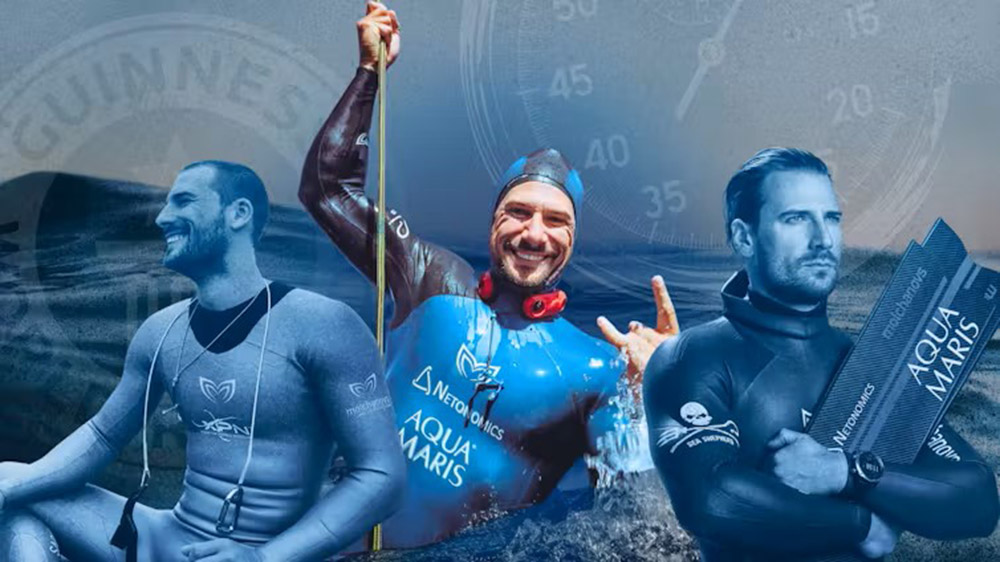September 5, 2025
The science behind a freediver’s 29-minute breath hold world record
How do freedivers delay a basic human survival response and how was Vitomir Maričić able to hold his breath 60 times longer than most people?
Most of us can hold our breath for .
A can be fatal, so we have an involuntary reflex to breathe.
But freediver Vitomir Maričić recently held his breath for of 29 minutes and three seconds, lying on the bottom of a 3-metre-deep pool .
This is about five minutes longer than set in 2021 by another Croatian freediver, Budimir Šobat.
Interestingly, all world records for breath holds , who are essentially professional breath-holders.
They do extensive physical and mental training to hold their breath under water for long periods of time.
So how do freedivers delay a basic human survival response and how was Maričić able to hold his breath about 60 times longer than most people?
Increased lung volumes and oxygen storage
Freedivers do cardiovascular training – that increases your heart rate, breathing and overall blood flow for a sustained period – and breathwork to increase how much air (and therefore oxygen) they can store in their lungs.
This includes exercise such as swimming, jogging or cycling, and training their diaphragm, the .
Diaphragmatic breathing and cardiovascular exercise train the lungs to expand to a larger volume and .
This means the lungs can and sustain a longer breath hold.
Freedivers can also to move the stored oxygen from their lungs to their airways. This maximises oxygen uptake to travel to other parts of the body.
To increase the oxygen in his lungs even more before his world record breath-hold, Maričić inhaled pure (100%) oxygen for ten minutes.
This gave Maričić a larger store of oxygen than if he breathed , which is only about 21% oxygen.
This is classified as an oxygen-assisted breath-hold in the .
Even without extra pure oxygen, Maričić can hold his breath for .
Resisting the reflex to take another breath
Oxygen is essential for all our cells to function and survive. But it is , not low oxygen that causes the involuntary reflex to breathe.
When cells use oxygen, they , a damaging .
Carbon dioxide can only be removed from our body by .
When we hold our breath, the brain senses the build-up in carbon dioxide and triggers us to breathe again.
Freedivers practice holding their breath to to high carbon dioxide and . This delays the involuntary reflex to breathe again.
When someone holds their breath beyond this, they reach a “physiological break-point”. This is when their diaphragm to force a breath.
This is physically challenging and only who have learnt to control their diaphragm can continue to hold their breath past this point.
Indeed, that holding his breath longer:
got worse and worse physically, especially for my diaphragm, because of the contractions. But mentally I knew I wasn’t going to give up.
Mental focus and control is essential
Those who freedive believe it is not only physical but also .
Freedivers train to manage fear and anxiety and maintain a calm mental state. They such as meditation, breath awareness and mindfulness.
Interestingly, :
after the 20-minute mark, everything became easier, at least mentally.
Reduced mental and physical activity, reflected in a , reduces how much oxygen is needed. This makes the stored oxygen last longer.
That is why Maričić achieved this record lying still on the bottom of a pool.
Don’t try this at home
Beyond competitive breath-hold sports, many other people train to hold their breath for .
For example, who collect pearls in Japan, and from South Korea who harvest seafood.
But there are risks of breath holding.
Maričić described his world record as:
a very advanced stunt done after years of professional training and should not be attempted without proper guidance and safety.
Indeed, both high carbon dioxide and a lack of oxygen can quickly lead to loss of consciousness.
Breathing in pure oxygen can cause due to free radicals, which are highly reactive chemicals that can damage cells.
Unless you’re trained in breath holding, it’s best to leave this to the professionals.![]()
This article is republished from under a Creative Commons license. Read the .
UOW academics exercise academic freedom by providing expert commentary, opinion and analysis on a range of ongoing social issues and current affairs. This expert commentary reflects the views of those individual academics and does not necessarily reflect the views or policy positions of the University of С»ĆĘé.
